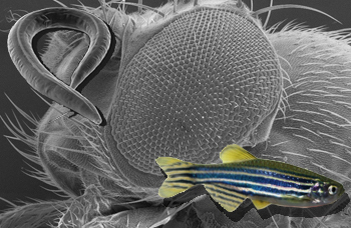
Department of Genetics
| head of dept.: address: room: phone: fax: web page: |
Tibor Vellai professor 1117 Budapest, Pázmány Péter sétány 1/C., 5.5 (+36-1) 381-2173; (+36-1) 372-2500 /8073 (+36-1) 381-2174 genet.elte.hu |
|
Genetics, as a basic integrative discipline of biological sciences
Genetics primarily deals with the inheritance of organisms’ phenotypic traits. The major goal of this discipline is to uncover the biological function of genes and their products (primarily proteins), using mainly in vivo (living) model systems. This aim can be primarily achieved by modulating gene activity (isolation of mutant alleles and performing gene silencing) and assessing the effect of such genetic interventions. By today, genetics became an integrative, basic discipline within biological sciences. This position of genetics is nicely expressed by Sydney Brenner at the ceremony of Nobel prize award in 2002: „I almost forgot to say that genetics will disappear as a separate science since, in the 21th century, everything in biology will become gene-based, and every biologist will be a geneticist.” Beyond its fundamental role in biological sciences of 21th century, genetics is also everywhere in our everyday life. There is almost no day without a media news on genetics. Modern medicine and pharmaceutical industry, most of the products generated by agriculture and cosmetic industry, DNA-based forensic sciences, many aspects of sport, and several other “civilian” areas each rely on the result of genetic research. Hence, genetics play a fundamental role in our industrial society. It provides theoretical and practical bases for technology, medicine and the protection of environment, and influences our everyday life. Education Teaching activity at the Department of Genetics primarily relies on knowledge provided by the main course Genetics and its associated Genetics practical course. Our teachers can provide almost every aspect of classical and modern (molecular) genetic research for students. Within a wide spectrum of obligatory and specialized courses, they can provide a deep insight into the following areas: molecular genetics, genomics, epigenetics, gene regulation, genetic interactions (epistasis analysis), bioinformatics (mainly analyzing DNA and protein sequences), developmental genetics, microbial genetics, and evolutionary genetics. In our teaching system, applied fields, such as forensic genetics, tumor genetics, genetic diseases and human origin, are heavily treated. Our vision in teaching is that a scientist with a great research experience in a certain field should give lectures on that particular subject, rather than extracting a dry knowledge from text books. Thus, a colleague with international recognition on a particular field teaches the subject in which he/she is experienced. Every year around 3-9 novel doctorandus start their PhD work in our genetics PhD program. Most of them receive the PhD degree after completing their training and thesis work, and then initiate a postdoc period in an outstanding laboratory on abroad. Research The current research activity at the Department of Genetics is mainly represented by projects focusing on developmental genetics. In their frame, the following genetic model systems are examined: the nematode Caenorhabditis elegans, the fruit fly Drosophila melanogaster, zebrafish (Danio rerio), a chordate, and red deer (Cervus ephalus), a mammalian model. By using these in vivo systems, the next research projects are currently under investigation:
Beyond research on developmental genetics, several bioinformatical (signaling crosstalk database construction) and human genetic (individual identification upon genetic polymorphism) analyses are performed by our PIs. Life at our Department The door of the Department of Genetics is always open for those interested in research and science. To achieve the goals of our research programs, we have developed fruitful collaborations with groups located at other departments of our Institute, and with researchers from other institutes. We have established a tight cooperation with the following research units: MTA TTK Institute of Enzymology, ELTE Institute of Chemistry (Department of Organic Chemistry), Institute of Molecular Biology, Medical Chemistry and Pathobiochemistry at Semmelweis University, MBK-NAIK in Gödöllő, and Institute of Genetics at SZBK in Szeged. In our department, several research programs have been realized by collaboration among different groups. Every week we demonstrate our results and problems in the frame of a progress report. Invited scientists also give a special-topic lecture monthly. Several social events (sport day, night of researchers, Christmas party) are used to bring us together. TDK and diploma works Information on programs and research groups at the Department of Genetics can be obtained from our homepage. Students who are interested in genetics should look after the person whose project is sympathetic. Group leaders and their contact:
Obtaining sufficient information and knowledge from genetics will provide a good job opportunity at both basic and applied fields. Basic science: PhD training, university departments (research and medical), research institutes (MTA TTK Institute of Enzymology; Agricultural Biotechnology Institute; Institute of Genetics at the Biological Research Centre, Szeged; National Research Institute). Applied: pharmaceutical industry, clinics, private sector dealing with research development. How can I become a geneticist? High motivation in having knowledge and performing experiments in the field of genetics. Successful BSc (as biologist) and MSc (specialization to Genetics, Cell and Developmental Biology) training. Successful PhD training and getting degree (Doctoral School of Biology, program genetics). |

